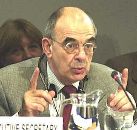UN’s Sudan envoy proposes steps to end Darfur fighting
UNITED NATIONS, Jan 12 (AFP) — The UN’s top envoy to Sudan on Tuesday proposed a series of steps to stop fighting in Darfur amid hopes that an end to a separate civil war might bring peace to the troubled area.
 Jan Pronk told the UN Security Council that political talks between the Khartoum government and rebels in Darfur should continue despite repeated and continued violations of a ceasefire accord.
Jan Pronk told the UN Security Council that political talks between the Khartoum government and rebels in Darfur should continue despite repeated and continued violations of a ceasefire accord.
He said those talks, due to re-start later this month, should be “de-linked” from discussions on security and humanitarian access to the region, a vast desert area about the size of France in the west of Africa’s largest country.
“The parties must be persuaded, by a combination of pressure and assurances from influential (UN) member states, that it is truly in their interests to respect the ceasefire and pursue a settlement through peaceful means,” he said.
He also proposed that both sides should pull back to areas they held in early December to “show their goodwill” and make sure their respective forces had enough supplies in order to “diminish the urge to steal, loot and kill.”
Sudan’s UN ambassador Elfatih Mohammed Erwa said the proposal to de-link the political talks was “interesting” but did not elaborate. He said the international community should put more pressure on the rebels.
Pronk said arms were pouring into Darfur and fighting was spreading, cautioning that the bloodshed could intensify despite a peace accord between the government and rebels in the south.
“We may move into a period of intense violence unless swift action is taken,” Pronk said.
The Islamic-dominated government in the north and largely Christian rebels in the south, led by John Garang, inked a much-awaited peace deal on Sunday that ended what had been the longest running war in Africa begun in 1983.
But the separate conflict in Darfur, started nearly two years ago in February 2003, has shown little sign of easing despite drawing significant attention from the rest of the world.
Around 70,000 people are estimated to have died in Darfur, many from hunger and disease, in the last several months alone while some 1.5 million others have been displaced, many into squalid and dangerous camps.
The government enlisted proxy militias, some known as “janjaweed,” to help put down the rebellion, which sought a greater share of oil revenues from the government to help develop Darfur.
But the janjaweed are blamed for a scorched earth campaign of rape and murder that the United States has termed a genocide.
Ambassador John Danforth of the United States, which has failed to get a reluctant Security Council to impose sanctions to end the violence, said that option was still on the table.
“It’s important for all parties in Darfur, the government and the rebels, to understand that there is a limit to tolerance,” Danforth told reporters.
“While it is clear that sanctions are opposed by some members of the Security Council, as a matter of principle … it may be possible to fashion something that would be agreed to,” he said.
Danforth also said Garang, who will become Sudanese vice president under the north-south accord, should use his contacts with the Darfur rebels to help end the bloodshed.
Pronk pressed the Khartoum government to abide by its pledge in July to bring to justice those responsible for violations of human rights in Darfur.
“The government has often declared that this could not be done easily overnight. That is to be granted. However it is not credible to wait half a year (since then),” he said.
